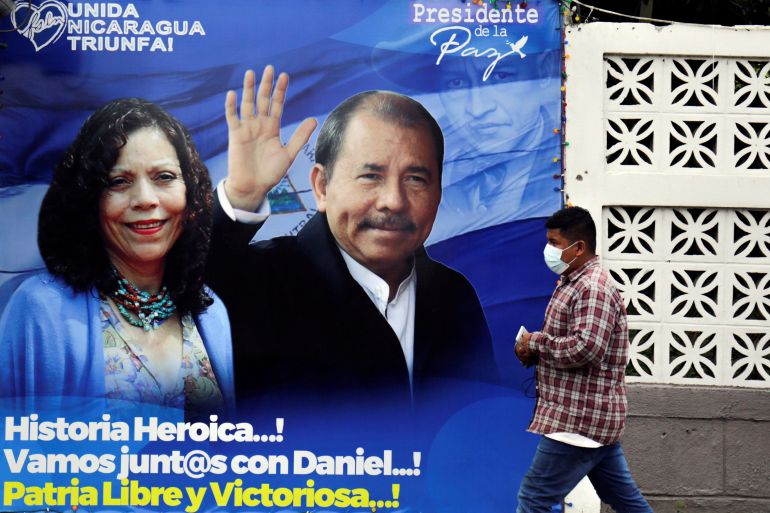US targets Nicaragua’s gold sector in latest push against Ortega
New sanctions are imposed in response to ‘attacks on democratic actors and members of civil society’, US says.

President Joe Biden has signed an executive order targeting Nicaragua’s gold industry, as the United States aims to punish Nicaraguan President Daniel Ortega over a crackdown on dissent and curbs to democratic institutions.
Biden’s executive order gives the US Treasury Department “the authority to target certain persons that operate or have operated in the gold sector of the Nicaraguan economy”, the department said in a statement on Monday.
Keep reading
list of 3 itemsNicaragua severs ties with Netherlands over ‘interventionism’
EU declares Nicaraguan envoy ‘persona non grata’ as tensions rise
It also allows Washington to bar new US investments in Nicaraguan economic sectors, imports of certain products from the Central American nation and exports by US citizens of certain items to Nicaragua, it said, among other potential measures.
The Treasury also sanctioned Nicaragua’s mining authority, the General Directorate of Mines, and a Nicaraguan government official and “close confidant” of Ortega.
“The Ortega-Murillo regime’s continued attacks on democratic actors and members of civil society and unjust detention of political prisoners demonstrate that the regime feels it is not bound by the rule of law,” Treasury official Brian E Nelson said in the statement.
“With President Biden’s new Executive Order, we can and will use every tool at our disposal to deny the Ortega-Murillo regime the resources they need to continue to undermine democratic institutions in Nicaragua,” Nelson said.
The Biden administration has imposed a slew of sanctions in recent months, including US visa restrictions, on Nicaraguan officials and their relatives over the country’s poor human rights record.
Ortega has faced growing international criticism over his government’s crackdown on opposition leaders and human rights activists, especially in the lead-up to elections last year that Western nations denounced as a “sham”.
Human rights organisations have denounced the wave of arrests, which has seen dozens of people detained and sentenced to often lengthy prison terms. Other opposition figures have fled the country, often to neighbouring Costa Rica.
In June, the United Nations human rights chief warned that “socio-political, economic and human rights crises” in Nicaragua were forcing thousands of people to leave their homes in a wave of migration that was growing in “unprecedented numbers”.
Ortega, who won a fourth consecutive term as president in November, has defended his government’s actions, saying those detained sought to destabilise Nicaragua.
He also has rejected outside criticism as attempts to meddle in his country’s internal affairs.
As Nicaragua faces global condemnation, it has withdrawn from the Organization of American States, and recently, the Ortega administration declared the European Union’s envoy to Nicaragua “persona non-grata”, precipitating her departure.
Vice President Rosario Murillo, who is Ortega’s wife, also said last month that the government would not allow the new US ambassador into the country due to his “meddling” attitude.
The envoy, Hugo Rodriguez, a former senior adviser in the US Department of State’s Bureau of Western Hemisphere Affairs, had told a US Senate hearing that he would “support using all economic and diplomatic tools to bring about a change in direction in Nicaragua”.
Rodriguez also described Nicaragua as a “pariah state in the region” and branded Ortega’s government a “dictatorship”.
In a White House factsheet on Monday, the Biden administration said its decision to expand sanctions powers against Nicaragua also was linked to the country’s “increasing security cooperation with Russia”.
It pointed to a recent UN General Assembly vote in which Nicaragua was only one of four countries to vote alongside Russia against a resolution condemning Moscow’s annexation of Ukrainian territories.
“While the United States and our allies continue to take steps to hold Russia accountable for its war of aggression in Ukraine, the Ortega-Murillo regime has increased its cooperation with Moscow by authorizing the continued presence of Russian military personnel and equipment in the country,” it said.
Meanwhile, later in the day, the US Department of State said it was imposing visa restrictions on more than 500 Nicaraguan citizens – including members of the country’s national police, judges, prosecutors and others “who enable regime repression and corruption” – and their relatives.